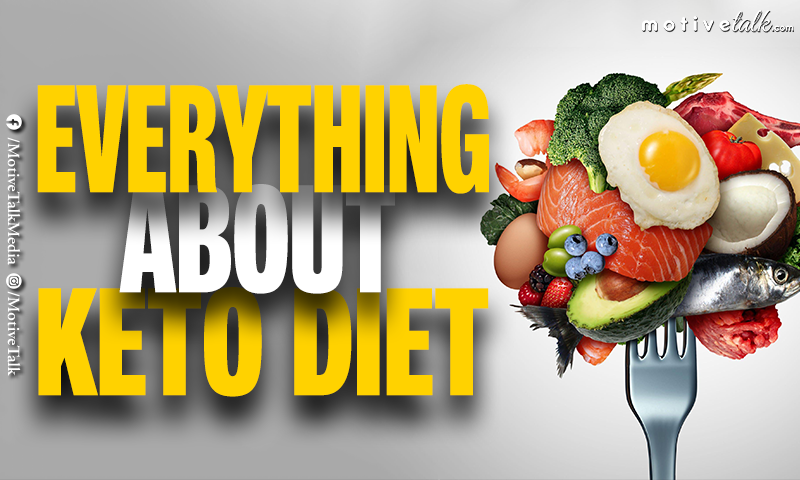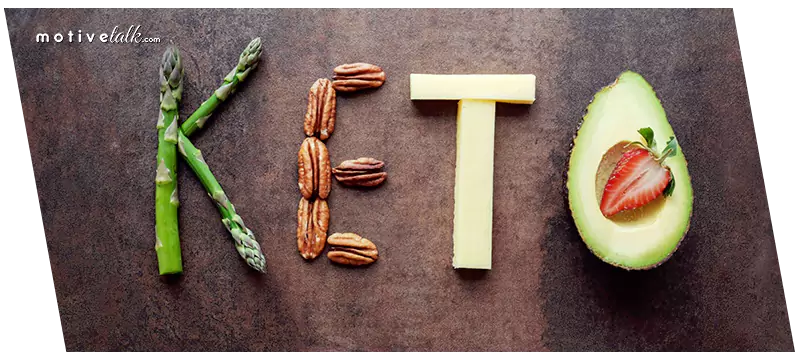Health & Fitness
Everything You Must Know Before Trying Keto Diet (Updated March 2023)

Have you been hearing a lot about the keto diet lately? It’s one of the most popular dietary plans out there—but how much do you really know about it? There are a lot of things to consider before starting the keto diet, and we want to make sure you have all the information necessary to make an informed decision.
In this article, we’ll help you understand what the keto diet is, break down the pros and cons of going on a keto diet, and give some insight into what it looks like to stick with a keto lifestyle. We’ll also share some tips for getting started and for staying motivated on your journey. Whether you’re just thinking about trying the keto diet or have been on it for a while, this guide is here to help you find success. Ready to get started? Let’s go!
What Is the Keto Diet?
If you’re considering trying the keto diet, you probably have a lot of questions about what it is, how it works, and if it’s worth the effort. To get started, let’s take a look at what a keto diet is and how it works.
At its core, the keto diet is an eating plan that focuses on eating high-fat foods and very few carbs. This approach reduces the body’s normal glucose supply from carbs and forces it to use stored fat instead for energy. Because of this, it can lead to weight loss in many individuals who follow this plan correctly.
The benefits of the keto diet don’t stop there; research shows that sustained low-carb diets can lower bad cholesterol levels, reduce inflammation, and improve insulin sensitivity. That said, following the keto guidelines strictly may be difficult or even unhealthy in some cases – which leads us to the next point…
How Does the Keto Diet Work?
The keto diet is a low-carb, high-fat diet that’s designed to put your body into a state of ketosis. In this state, your body breaks down fat into molecules called ketones and uses them as energy instead of carbs. To achieve this, you need to eat fewer than 50 grams of carbs each day while eating plenty of healthy fats and proteins.
When you start the keto diet, your body goes through a transition period as it shifts from burning carbs to burning fat. This process, known as “keto-adaptation”, can be difficult and often includes symptoms like fatigue, headache, muscle cramps and hunger pangs. But over time, these symptoms should fade away as your body gets used to its new fuel source.
Most people who go on the keto diet typically limit their carb intake to 20–50 grams per day and focus on eating healthy sources of protein like fish and eggs along with plenty of vegetables. Along with this comes an increase in healthy fats from sources such as olive oil, avocado oil, nut butter, nuts and seeds. Eating in this way can help you to reach your health goals such as weight loss or improved blood sugar levels.
Advantages of the Keto Diet
One advantage of the keto diet is that it can be quite effective for weight loss. Since it’s based on a high-fat, low-carb approach, it forces your body to burn fat for energy, which can lead to long-term weight loss. And praise be, there is no calorie counting or portion control on a keto diet – so you can actually enjoy your meals! It also helps reduce hunger pangs due to its high fat content and therefore keeps you satiated for longer. So, if you’re looking for something that will help make your life easier while helping you lose weight, keto might be the right choice for you.
Another big advantage of going keto is it improves blood sugar control and insulin sensitivity in people suffering from type 2 diabetes. The mechanism behind this is that limiting carbohydrates significantly reduces blood glucose and insulin levels – switching your primary energy source from carbs to fat helps your body burn more fat and insulin levels remain more stable.
It’s also been observed that those following the ketogenic lifestyle often experience increased mental clarity, better concentration and improved energy levels. This could be due to increased fat burning in the body which then provides a steady supply of fuel for your brain instead of relying on glucose alone for energy production – leading to an uplift in mental agility.
So as you can see, there are several advantages to going keto – from efficient fat-burning and improved cognitive functioning to increased energy levels and better blood sugar control. All of these benefits are achievable if the diet is followed correctly and consistently – making keto something worth considering when looking for efficient diet options!
Disadvantages of the Keto Diet
When it comes to the disadvantages of the Keto diet, there are a few. First, some may find that it’s difficult to stick to for the long term. The diet is restrictive and requires you to cut out certain foods that you may enjoy eating. In addition, it can be expensive because of the higher-priced fats and proteins that you’ll need to buy.
Another disadvantage to consider is that it may affect your performance in physical activities. While some people have found success with increasing their energy levels on the Keto diet, others have found that limiting their carbohydrates affects their ability to do strenuous activities for long periods of time.
Finally, if you don’t plan your meals right, this diet could also lead to deficiencies in vitamins and minerals that come from foods like fruits and vegetables that contain carbohydrates. This means you’ll need to make sure you’re taking a multivitamin and eating foods high in fiber like broccoli and spinach in order to avoid any potential issues.
Potential Health Risks of Going on a Keto Diet
Before you jump on the Keto bandwagon, you should understand the potential risks of this high-fat diet.
For starters, a Keto diet can be deadly if done improperly and without proper medical supervision. A drastic reduction in carbohydrates can cause dangerous irregularities in your blood sugar levels and endanger your health.
Another potential health risk associated with going on a Keto diet is that it can lead to dehydration, as it eliminates key sources of electrolytes like sodium, potassium and magnesium from your diet. If you don’t make sure to get enough of these electrolytes through supplementing or consuming a variety of foods like leafy greens and avocados, then you could become dehydrated.
In addition, some studies have linked the Keto diet to negative changes in cholesterol levels and an increased risk for cardiovascular disease. If you have pre-existing heart problems or high cholesterol levels, then you should speak to your doctor before starting a Keto diet.
Though there are benefits associated with going on a Keto diet, it’s important to keep in mind the potential risks and make sure that you’re listening to your body throughout the process. The best way to do this is by speaking with a registered nutritionist or doctor who is knowledgeable about ketogenic diets before starting the process yourself.
Tips for Getting Started With Keto
So how do you get started with a keto diet? Here are a few tips to help you out:
-
Drink more water
The most basic tip is to make sure you’re drinking enough water. This helps your body adjust to the keto diet and helps your body be more efficient in burning fat. It’s recommended that individuals on a keto diet consume at least 2 liters of water per day or eight 8-ounce glasses.
-
Eat mindfully
Mindful eating is key when transitioning to a keto diet. Make sure you’re eating the right foods and paying attention to portion sizes. The best thumbs rule is to fill 50% of your plate with vegetables, 25% with healthy fats, and another 25% with lean proteins.
-
Track your macros
Tracking your macros can be helpful in keeping track of what you’re eating and whether it fits into the guidelines of the Keto Diet. Many recommend tracking net carbs, fat, and protein daily as this can help with weight loss efforts by tracking how many calories are being consumed on the diet each day.
By following these tips, you can start to get an idea of what it takes to incorporate a keto diet into your lifestyle and will be well on your way toward getting started!
Conclusion of Keto Diet
Ultimately, whether or not the Keto diet is right for you is something only you can decide. While there are benefits to following a keto diet, not everyone is wired to handle the demands of a high-fat, low-carbohydrate diet.
For some people, the benefits of keto may outweigh the potential drawbacks, like potentially reducing the risk of heart disease, and diabetes, or improving their cognitive abilities. Yet, for others, some of the negatives, like fatigue and sugar cravings, may be too much to deal with.
If you think the Keto diet may be right for you, make sure to check with your doctor to make sure you’re taking the right steps to meet your goals.
You may also read
-
Who is3 months ago
Who Is Fauzia Mubarak Ali? Famous Cat Stevens Wife & Their Children (Update: Jan 2024)
-
Comics9 months ago
Best Shrek Quotes About Life From The Shrek Series
-
Miscellaneous2 years ago
Lone Wolf Quotes – That Will Trigger Your Soul and Mind
-
Miscellaneous7 months ago
Warrior Quotes – That Will Make You More Stronger
-
Miscellaneous11 months ago
Top 27 Letterkenny Quotes – That Will Make Anyone Laugh
-
Super Hero2 years ago
Captain America Quotes – All Are Ultimate Leadership Quotes
-
Politicians2 years ago
Most Powerful Vladimir Putin Quotes – That Will Blow Your Mind
-
Miscellaneous2 years ago
Dalai Lama Quotes – That Will Change Your Values and Vision
































